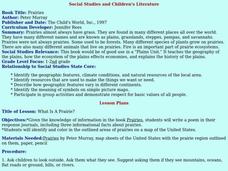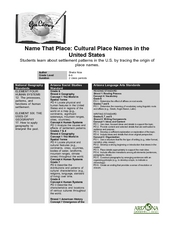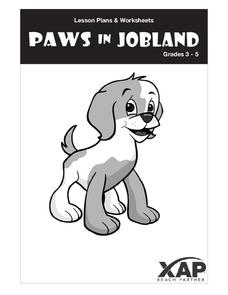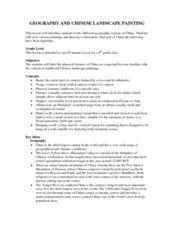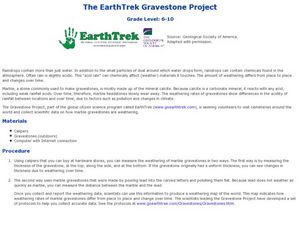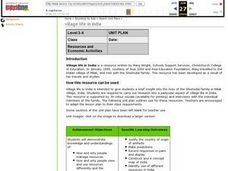Curated OER
Your Neighborhood Geography
Tenth graders use maps and an atlas to observe different climates throughout the world. In groups, they brainstorm what they expect to see in their own neighborhoods and take pictures. They present their pictures to the class and write a...
Curated OER
Deforestation
Learners identify the different tropical rainforests in the world using a map. In this ecology instructional activity, students describe the different methods of deforestation. They create a memo and present it to class.
Curated OER
Social Studies and Children's Literature
Young scholars write a journal in response to literature. The story that is read is about prairies. The subject of prairies becomes an object for research. The culminating activity is the making of a map where prairies exist in the...
Curated OER
The Coldest Continent
Students use the internet to conduct research on the continent of Antarctica. As a class, they review the continent's climate and the reasons behind the cold temperatures. After reading an article, they draw a picture of what they...
Curated OER
Name That Place: Cultural Place Names in the United States
Students examine the origin of the people that settled in the United States. In this United States History instructional activity, students work in small groups to complete several activities that explore early settlement, such as a...
Curated OER
In The Shadow of Angkor
Students are introduced to basic historic and geographic facts about Cambodia. They understand the spiritual component of Cambodia's art. They identify Cambodia on a map of the world. They construct a graphic representation of a film...
Curated OER
Trekking to Timbuktu: The Geography of Mali - Student Version
Eleventh graders locate Mali on a world map, describe the landscape and climate of Mali, and locate the city of Timbuktu and describe the local weather. They compare life along the Niger in ancient times to that of today
Curated OER
A Message in a Bottle
Learners investigate the motion of water currents by mapping the possible movement of messages cast into the ocean in bottles.They accurately plot the appearance of bottles on a world map and illustrate the flow of an ocean current...
Curated OER
Science: Trouble in the Troposphere
Students research a NASA Website and record information about an assigned city's tropospheric ozone residual monthly climate. In groups, they graph the information for the past year. They form new groups and compare their city's...
Curated OER
Discovering Asia, Past and Present
Students research a specified country. Using the internet, Inspiration software, tourist information, and their textbooks, students create a multimedia report containing information on the climate, natural resources, the economy, and...
Curated OER
Paws in Jobland
Students explore jobs in different countries . In this lesson about different countries through research. Students are broken into groups and given a country to research. Each group is provided with a worksheet with 14 questions to be...
Curated OER
Great North
Students use maps to locate the Arctic Circle, the North Pole and Northern Europe. They draw and label countries within the Arctic Cirlce and identify the groups of people who live there. They also watch and answer questions about the...
Curated OER
Geography And Chinese Landscape Painting
Fourth graders label the physical features of China on a map and become familiar with
the content of traditional Chinese landscape paintings in this lesson intended for the forth grade classroom.
Curated OER
Looking for the Dirty Scoop
Students read "The Negative Effects of Urban Sprawl." They discuss the main forms of transportation in their city and conduct research about the development of their community in terms of land use. Students sketch a map of their city and...
Curated OER
Fallout!
Students plot the locations of fallout from two disasters that polluted much of the world's air. They plot the ash fallout from the 1980 Mt. St. Helen's eruption to see what the wind patterns in the United States look like overall. Next...
Curated OER
Where Does Earth's Heat Come From?
Young scholars try to determine how the Earth is heated by the sun and other sources. In groups, they identify the other sources of energy and discover why different parts of the world are heated differently during the year. They...
Curated OER
A Message in a Bottle
Middle schoolers create an imaginary tale of travel and adventure. They explain who they are, where they were going when they got stranded, where they left from, and how they were traveling. They place their stories in bottles and set...
Curated OER
Turin, Geography, Culture And Sports
Students study why certain locations are suitable to host the Winter Olympics. They research the characteristics of Turin, Italy, plan a trip and create a multimedia scrapbook of the trip.
Curated OER
EarthTrek Gravestone Project
Students explore the effects of acid rain. In this acid rain lesson, students investigate the effects of the weathering from acid rain in different places. Students visit cemetaries to collect data about the effects of acid rain on the...
Curated OER
Village Life in India
Learners use included links to research the lives of people living in a small village in India.
Curated OER
Who's The Boss?
Upper elementary and middle schoolers research and analyze some different types of governments. Democracies, Monarchies, and Dictatorships are some of the types that are looked at. Learners use the Internet to gather information that...
Curated OER
Geo-Magazine
Divide your geography class into groups and have each research an assigned region. The result of this project is a regional magazine that addresses the five themes of geography. Many valuable resource links are embedded into the page...
Curated OER
Tour Of South America
Students explore South America. In this geography lesson, students research landmarks of historical or national significance and use their findings to create slideshows.
Curated OER
The Solstices
Compare surface temperatures when the solstice occurs in the different hemispheres. Young scientists draw conclusions from their investigation of data collected using spreadsheets and a globe.




